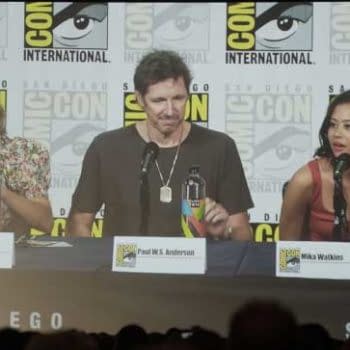Posted in: Books, Games, Video Games | Tagged: final fantasy xi, Genese Davis, Holder's Dominion, world of warcraft
Breaking Borders With Genese Davis And 'Holder's Dominion'
Novelist Genese Davis is a gamer who's clocked-in many hours playing MMORPGs like Final Fantasy XI and World of Warcraft. She leveraged her knowledge of online games to write The Holder's Dominion, a 2013 sci-fi thriller starring Kaylie Ames, a female gamer battling a hacker who's wreaking havoc on players' lives in the fictional gaming world of Edannair.
The book has drama, surprises, and tortured characters—all the ingredients of a nifty thriller. But years ago, publishers saw one big problem that prevented them from printing it: the main character was a woman, and they wouldn't take the book unless Davis turned her into a man.
Two publishers offered Davis lucrative deals if she'd comply. She didn't, and the experience was disheartening.
Of that experience Davis said,
"It was hard to say no because, as a new writer, the allure and excitement of getting a book deal is so hard to turn down, but the whole reason I wrote this book was because I wanted to shine a spotlight on personal experiences, and I am a woman."
Davis started playing and mastering online games more than 10 years ago.
"I was hardcore. I became a very good player and I was able to compete just as good as the boys," she said. But unfortunately, she and other female gamers were seen as exceptions, not the norm. She wrote Holder's in large part to show that not all gamers were male, "I had to break that stereotype because I was the proof."
Yet according to Davis, publishers felt that her book would sell more copies if it starred a man. They were business-related motives, but there was probably a perception problem as well—one that goes beyond the publishing industry.
Take this situation, for instance.
Not too long ago, gender-related video game statistics dropped that confused some people, like 2014 survey data from the Entertainment Software Association revealing that women comprised 48 percent of the gaming population.
This was followed by a 2015 stat from the Pew Research Center claiming that 50 percent of men and 48 percent of women played video games on a console, PC, or handheld device.
Evidence seemed to make it clear: women play video games.
But certain people were perplexed about the information. The Pew data seemed to indicate that most Americans—male and female—considered gaming a male-dominated activity, and men who played games were more likely to identify themselves as "gamers" than women who did the same.
Adding to that confusion is the perceptions about what games are "legitimate" in the eyes of the gaming community as a whole. Women play mobile games like Candy Crush in large numbers, but a lot of people don't consider those kinds of players to be real gamers, not compared to the legions of men who spend hours upon hours enraptured with Call of Duty or Metal Gear – women play those kinds of games too of course, but in smaller numbers.
It's this line of thinking that causes female players to feel abnormal for venturing into "male" territory. Davis saw it for herself after she self-published her book through Beaver's Pond Press.
"I had a lawyer email me in her 40s. Before reading Holder's Dominion, she was scared to death to tell anyone at work that she played online games," Davis said. "She thought her coworkers would ridicule her, so there's proof right there."
However, a 40-something male lawyer, in Davis's opinion, probably wouldn't be ashamed of openly admitting his love of MMORPGs. Holder's helped the female litigator overcome her fear.
"She said reading Holder's Dominion gave her the courage to talk about her passions for online gaming," Davis said.
Holder's Dominion shows that the "dominion" of video games is more inclusive than many people think. Changing people's opinions about the online gaming community has been a long and arduous journey for Davis, but it's a journey that may end in a fabulous destination if recent pop culture trends continue.
Making Stories in a Changing World
Many people doubted the marketability of female protagonists in mainstream action tales back when Davis started writing Holder's, but times seem to be changing.
The Warner Bros. blockbuster Wonder Woman, for example, blew the lid off of the North American box office earlier this summer, making more money than the studio anticipated and the runaway success of a major female action movie could open doors for more stories in the same category.
Davis, a Wonder Woman fan who's spoken on panels analyzing the movie, has already seen things start to shift. She's been working with actor and screenwriter Adam G. Simon to turn Holder's into a film for years now and Wonder Woman's prevalence has made executives more receptive to discussions.
"He has been writing a screenplay version of my book, and he has been talking to producers," Davis said. "Wonder Woman has absolutely helped change the perception."
Although discussions are great; they're still just discussions, so a silver screen version of Holder's is still way off. Regardless, Davis feels that the pop culture landscape is more hospitable to female-focused action entertainment in a post-Wonder Woman world. It's a welcome development that's come about just as the image of female gamers becomes more mainstream.
However, Holder's is just as much a story about gaming as it is one about female heroism, if not moreso, and movies based on video games have a horrible reputation at the box office. Critics eviscerated box office failures like Assassin's Creed (2016), Prince of Persia: The Sands of Time (2010), and countless others. Even movies influenced by video games or centered on gaming culture have had it rough, like Pixels (2015) and the barely remembered 1989 drama The Wizard.
Davis feels that critics are often overly harsh on video game-related films. One reason is because a lot of them don't understand the source material because they aren't gamers themselves. She felt that both Assassin's Creed and Warcraft were better than writers gave them credit for.
"As someone who has played Assassin's Creed and knows screenplay and story, I did like the movie because it embodied the essence of the game very well," she said. "It got bad critiques because it was a tiny bit too far where someone wouldn't understand if they didn't play the game."
She feels that movies like Assassin's Creed were good enough to be a step in the right direction when it comes to improving the video game movie's image, in spite of the critical drubbing.
There's definitely more work to be done, but someday Hollywood's bound to get it right. If Steven Spielberg's upcoming Ready Player One does well, for example, that may do the trick. Its story follows a guy in dystopian future who searches for an item in a virtual reality game that's supposed to lead to a fortune.
Just like Holder's, Ready Player One is a book based on a fictional game that could become a successful film. It's scheduled for release in March 2018, and Davis will be watching its performance closely. Spielberg's efforts may work wonders for video game movies where others have failed.
"Ready Player One can be even better and open up more avenues," she said.
Art Imitates a Dangerous Life
Holder's Dominion currently enjoys good reviews on its Amazon page. The aggregate reader rating system has given the book four and-a-half stars out of five.
This critical success undoubtedly comes from good writing of course, but it's also possible that readers are intrigued by the book's eerie similarities to real-life drama. If "ripped from the headlines" themes have worked for TV shows like the venerable Law and Order series', maybe they've also worked for Davis in-print.
Case in point: In Davis's book, the Holder is an alias for a hacker who plays an MMORPG and hurts other players. This Holder bullies gamers and forces them to perform harrowing, humiliating tasks in the real world called morphis trials. These trials begin in a digital environment, but they can end in dangerous, life-threatening situations in-person.
Games have also caused people pain in the real world, both accidentally and intentionally.
In recent years, multiple teens and adolescents around the globe have hurt or killed themselves in incidents related to the Blue Whale Challenge, an alleged online suicide game. In the 50-day challenge, an anonymous administrator assigns daily tasks that require people to torture or endanger themselves. These players are told to commit suicide on the fiftieth day. It's unclear whether or not the Blue Whale Challenge is real or an Internet rumor that fascinates at-risk youth, but authorities have found drawings of blue whales and other related evidence victims' homes and belongings. The game has been linked to two American teen deaths this year, one in Texas and one in Georgia.
Elsewhere this summer, a Pokemon Go-related accident permanently injured a 14-year-old boy in Western Australia.
On May 15, the boy was moving on-foot hunting for digital creatures on his phone, but he tripped and fell because he was distracted by his screen. The injury from the mishap fractured his optic nerve, and he lost sight in one eye days later.
Released in July 2016, Pokemon Go is an augmented-reality game where players use GPS on their mobile devices to look for virtual creatures that appear on the screen as if they're in real-life locations. It's usually fun but can be a recipe for disaster if players get carried away.
Davis started writing Holder's years before the abovementioned Pokemon Go or Blue Whale Challenge cases took place, but she's no psychic. She's merely a forward-thinking writer who could imagine how destructive online gaming can be for people who can't handle it.
"I think Holder's can show that there are people that get way immersed and way hardcore and it becomes a detriment for sure that absolutely exists," she said.
Future World Building
Fans can visit Davis this week on the exhibit floor at San Diego Comic-Con. She's appearing on the exhibit floor at the Pop Life section of the Funko stand on Booths #5341 and #5347. She'll also be joining Prior at Booth #1529 representing Heavy Metal. Her remaining panel is Women Creators Breaking Stereotypes on Sunday, July 23 at 3 p.m. in Room 32AB.
Davis has experience hustling and networking to make things happen because she's been a staple at many of the big genre cons for years. She loves meeting with fans, and pretty soon she'll have more books to offer when they see her.
Current and upcoming projects include:
- Three novelizations of sci-fi films from Benaroya Pictures, the first of which will be released some time in 2018;
- A fantasy book based on Grimm Brothers tales for Pop Life Entertainment with illustrations from artist Rob Prior, also likely dropping in 2018; and
- Crafting game storylines for Canadian-based developer Spearhead Games.
The future looks busy for Davis, but she's going to try to squeeze-in some time for Holder's Dominion 2, but that likely won't come out until at least 2019 with everything else she's got going on.
And Davis isn't stopping there. The storyteller's always got her eyes on the future, and she wants to develop another novel based on her own IP about the afterlife, but that project's probably extremely far off.
"We all have different perspectives on religion, heaven and hell, and reincarnation, and I'm really excited about that," she said.




![Bleeding Cool Played Super Smash Bros. Ultimate and Got Beat Up [SDCC]](https://mlpnk72yciwc.i.optimole.com/cqhiHLc.IIZS~2ef73/w:350/h:350/q:75/rt:fill/g:ce/https://bleedingcool.com/wp-content/uploads/2018/07/20180720_162626-350x350.jpg)










